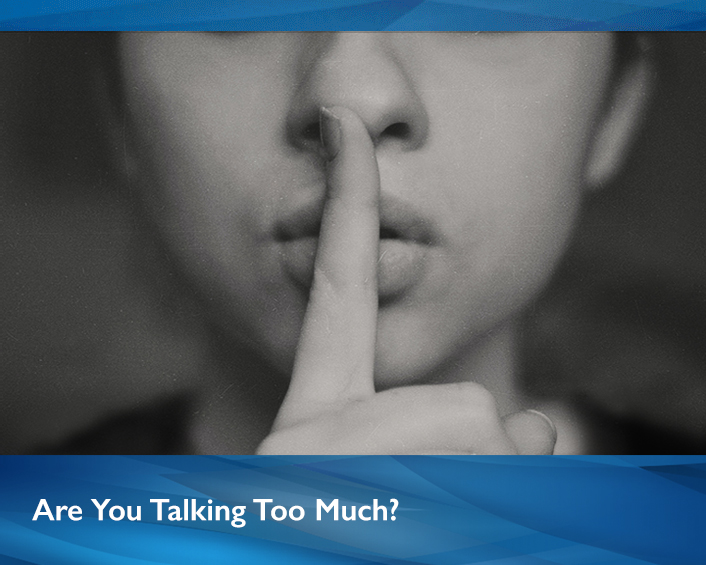
It may cost you the offer.
You go into the interview confident that you’re well prepared. Ready for anything. But are you? No matter how prepared you are, a potential obstacle still stands between you and the offer – Talking Too Much!
The nerves that arise when interviewing impact us in various ways. For some of us, our mouths become as dry as the desert, or our palms drip perspiration. Others become very shy, speaking in whispered tones and saying little. But, for quite a few of us, our nervous energy has us prattling on and on. Though seemingly not a big deal, this lack of self-control may very well cause you to lose your audience.
Key Point
Learn to find your balance before saying too much, but don’t clam up. Say just enough.
The more you talk, the more likely it is that you will say the wrong thing, or that people will forget what you said. The more someone forgets what you said, the more likely it is that they will remember something other than the main message you wanted to convey. You might even sell yourself out of the job.
Let’s consider a few reasons you might to talk too much, and what you can do to manage this tendency.
1. You think the interviewer wants to know more.
The interviewer asked a question, and you provided an organized and succinct response. Then the interviewer stays silent and just looks at you. You assume this is the interviewer’s way of wanting you to say more. So you do. In this situation, when you’re unsure what the interviewer wants, ask this before you continue: “Did I provide the level of detail you were hoping to get?” Or, “Was that the sort of example you wanted?”
Key Point
After 90 seconds of your continuous talking, the interviewer has probably stopped listening.
2. It’s unclear what the interviewer has asked
Occasionally, you may be unsure what information the interviewer is asking for with a particular question. If this happens, ask for clarification. “Would you please rephrase the question?” Or, “Would you please ask the question another way?” Having a clear understanding of the question lets you give a more relevant response.
Key Point
Pause to regroup, since continuing to talk will only worsen the situation.
3. You lose your train of thought, but keep talking anyway
If you do start rambling, pause for a moment and ask if you can rewind and answer the question again. Consider saying something like this, “I apologize, I was rambling. With your permission, I’d like to hit delete and start over.” Pausing to breathe will help you to regain your focus, hit the reset button, and provide an answer that is on-point. Key Point Pause to regroup, since continuing to talk will only worsen the situation.
Key Point
Re-engage the interviewer and conclude by summarizing the key idea of your answer.
4. A long answer to the question truly is required
What do you do when you are asked a question that does require a longer answer? When this happens, remember that interviewers are human, and on occasion their attention wanders. During your answer, you can lean forward at times, gesture a bit, smile, and use other techniques to hold their attention. Certainly at the end or your answer, you’ll want to draw the interviewer back in. Doing so can be as simple as asking, “Is there anything in my response that you’d like to know more about?”
Key Point
Re-engage the interviewer and conclude by summarizing the key idea of your answer.
Remember, the key is finding that sweet spot before saying too much. Say just enough!
